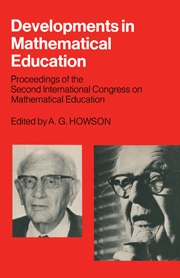 Developments in Mathematical Education
Developments in Mathematical Education from PART III - A SELECTION OF CONGRESS PAPERS
Introductory remarks
Many mathematicians, whatever their feelings about ‘New Mathematics’ still love to start with axioms. Therefore I hope to capture your attention by offering you three axioms as a starting point to this paper. While to me the following statements are self evident, it may well be that to some of you they are not. Nevertheless, I give them to you as axioms.
The first is that mathematics should be enjoyed. I would consider that many teachers in the last few decades have tried to make it so by enriching primary school children's lives with plentiful, enjoyable experiences in true ‘pre-mathematics’, as contrasted to a drilling in ‘sums’, thus laying a foundation for both emotional and intellectual appreciation of the subject.
I also take as an axiom that there are five ‘cornerstones’ of learning of which mathematics is one. The others would be language, movement, some form of scientific exploration and some work that is normally considered creative. (This statement is difficult to word unambiguously since, to some of us, mathematics is creative.) These five cornerstones are vitally important in early education since, as well as being of maximum value in their own right, they are the essential tools of all future learning. Hence, in the integrated work that goes on in many of our primary schools their contribution is of double worth.
To save this book to your Kindle, first ensure [email protected] is added to your Approved Personal Document E-mail List under your Personal Document Settings on the Manage Your Content and Devices page of your Amazon account. Then enter the ‘name’ part of your Kindle email address below. Find out more about saving to your Kindle.
Note you can select to save to either the @free.kindle.com or @kindle.com variations. ‘@free.kindle.com’ emails are free but can only be saved to your device when it is connected to wi-fi. ‘@kindle.com’ emails can be delivered even when you are not connected to wi-fi, but note that service fees apply.
Find out more about the Kindle Personal Document Service.
To save content items to your account, please confirm that you agree to abide by our usage policies. If this is the first time you use this feature, you will be asked to authorise Cambridge Core to connect with your account. Find out more about saving content to Dropbox.
To save content items to your account, please confirm that you agree to abide by our usage policies. If this is the first time you use this feature, you will be asked to authorise Cambridge Core to connect with your account. Find out more about saving content to Google Drive.